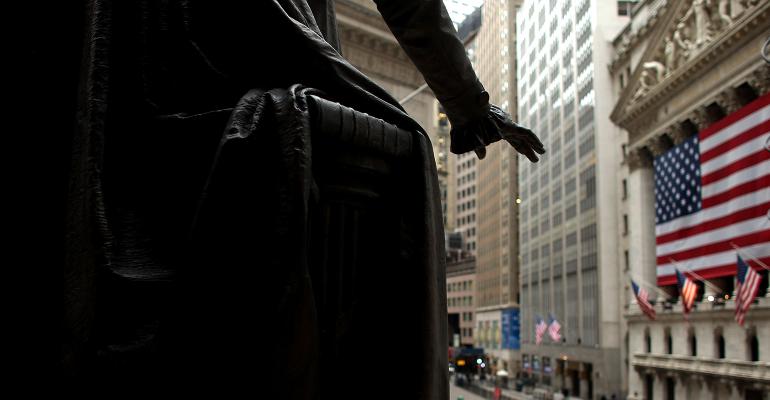By Ben Carlson
(Bloomberg Prophets) --One of the worries about the large tax cuts for corporations is that stock-market investors will benefit more than working-class wages. There is a growing concern that much of the savings will be used for dividends or share repurchases, which would potentially boost the returns for those invested in the stock market. This is likely to accelerate U.S. inequality because the wealthy are now by far the largest owners of equities.
Almost half of all American households own some stock through direct purchases, mutual funds, ETFs or pensions, but the top decile controls the bulk of those assets. According to research from the New York University economist Edward Wolff, the top 10 percent of American households now own 84 percent of all stocks. That’s up from 77 percent ownership in 2001.
Stock market ownership wasn’t always so concentrated at the top. These trends are cyclical, and much of the ebb and flow has to do with people’s experience in the markets. For example, after the highly inflationary period of the 1970s there were very few U.S. stock market owners.
According to Maggie Mahar, the share of households with a stake in the stock market was just 19 percent in 1983, not too long after the infamous “Death of Equities” Businessweek cover. No one wanted anything to do with stocks, considering you could earn close to double-digit interest rates in bonds or money-market funds in the early 1980s.
The great bull market of the 1980s and 1990s changed all that, as retail investors flooded in. In 1983, households with incomes of $250,000 or more owned 43 percent of all publicly traded stocks. By 1992, that share had dropped to 23 percent, while Americans with incomes of less than $75,000 saw their share jump from 24 percent in 1983 to 42 percent by 1992.
By the end of the dot-com bubble in 1999, retail investors were all in on the stock market. The average equity allocation by investors was well over 50 percent, the highest it’s been before or since. Individual investors accounted for 30 percent of trading on the NYSE, compared to just 15 percent in 1989.
The dot-com bubble and the run-up in securities prices in the 1980s and 1990s were a great thing for household wealth and interest in the markets. By 2002, almost 60 percent of stock owners had purchased their first shares after 1990; 30 percent of all stock owners had taken the plunge after 1995. The 19 percent share of households in the stock market in 1983 was up to 49 percent by 1999.
Middle-class investors have likely been scared out of the stock market by the two enormous market crashes over the past 20 years or so. The Great Recession also dealt a crushing blow to housing, which makes up a large proportion of U.S. middle-class wealth. Just 27 percent of the middle class owns at least $10,000 in equities, compared with 94 percent of the wealthiest households. The majority of middle-class wealth is tied to homes, as more than 60 percent of investible assets are in a primary residence. Stock ownership makes up less than 10 percent of total assets for the middle class. Crashing home values during the last crisis decimated wealth for this cohort, while the very rich have less than 8 percent of their wealth tied up in their primary residence.
The stock market can’t continue to rise in a straight line forever, but over the long haul it is probably the best opportunity the middle class has to take part in the growth and innovation from corporations. Tax cuts for the rich and large corporations will likely add to the growing wealth inequality.
Unfortunately, many working-class employees don’t have access to tax-deferred retirement savings vehicles. It’s estimated that just 45 percent of U.S. workers participate in an employer-sponsored retirement plan. Unless we make it easier, or mandatory, for people to save and invest in the stock market, wealth inequality will continue to worsen.
This column does not necessarily reflect the opinion of the editorial board or Bloomberg LP and its owners.
Ben Carlson is director of institutional asset management at Ritholtz Wealth Management. He is the author of "Organizational Alpha: How to Add Value in Institutional Asset Management."
To contact the author of this story: Ben Carlson at [email protected] contact the editor responsible for this story: Max Berley at [email protected]
For more columns from Bloomberg View, visit Bloomberg view





